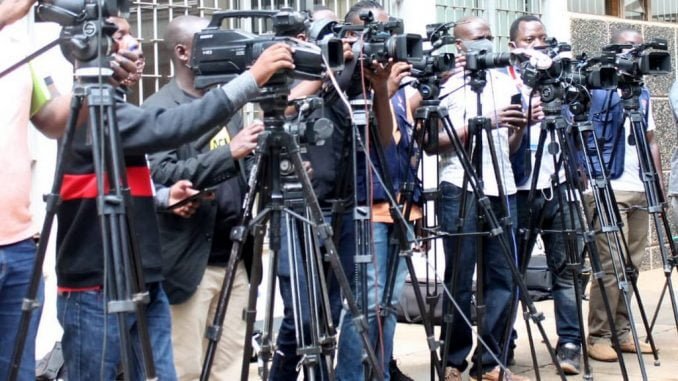
Kampala, Uganda | URN | Media practitioners and activists are up in arms against the 7-day ultimatum that was given to practicing journalists by the Media Council of Uganda to register or risk being denied accreditation to cover the 2021 elections and other public functions.
Last week, Paulo Ekochu, the Chairperson of the Media Council of Uganda said they will open criminal charges against all media houses both local and international including freelance journalists who fail to register.
He also recalled all the accreditation cards issued to journalists this year, saying they will be replaced with new cards with security features to avoid forgery.
Mr Ekochu noted that the registration exercise will start this week and run-up to December 21, 2021, to ensure the industry is well-monitored and ensure media practitioners are not harassed during the election period.
The media council stance has not gone down well with media activists and practitioners led by Uganda Journalists Union [UJU] and the African Centre for Media Excellence [ACME] among others.
In a statement issued on Sunday 13th, December 2020, UJU urges journalist to unite and “Say No to Media Accreditation,” saying it is aimed at “intimidating journalists, curtail access to information, stifle and suppress freedom of expression.”
UJU notes that the Electoral Commission [EC] has always accredited journalists covering elections without any hitches and complaints. The Union questions why the Media Council of Uganda is usurping the powers of the Electoral Commission [EC] and the “hidden agenda” the council “is peddling.”
Lucy Anyango Ekadu, the President Uganda Journalists Union [UJU] says “the Media Council ought to have been concerned now with the condition of journalists who were beaten and seriously injured this week by police during presidential campaign meetings.”
Adding that, “there is every reason to believe the Media Council is planning to impose fascist and despotic draconian laws on the journalists in a bid to censor the media ahead of the 2021 general elections.“ UJU also urges media stakeholders including the international community to engage the government on the safety of journalists and impunity by security agencies.
ACME, an independent non-profit professional media organisation has also voiced similar concerns about the timing and effects of the directive on media freedom.
The organisation noted in a December 11th, 2020 statement that it is ironic that the guidelines were issued on December 10th on the International Human Rights Day.
It adds that while recent physical attacks on journalists are regrettable, they were not occasioned by the journalists lack of identification.
Dr. Peter G. Mwesige, the ACME Executive Director says “we are afraid the move has the potential of doing exactly the opposite at a time when citizens need access to reliable and timely information in order to make informed political decisions.”
He argued that “the provisions of the Press and Journalist Act on licensing of journalists are controversial and still the subject of litigation in the Constitutional Court.”
Mwesige further explains that the Media Council is “supposed to issue practising certificates to journalists who have presented certificates of enrollment issued by the National Institution of Journalists of Uganda (NIJU).”
However, he notes that “NIJU has been moribund for more than 15 years, and therefore it could not have issued any certificates of enrollment on which the council would base its decision to issue practising licenses.”
He contends that the Supreme Court ruled that the primary objective of media law and regulation should be to promote the right to freedom of expression and not to limit it. He urged the council to hold more consultations with different stakeholders.
The incoming President of Uganda Journalists Association, Mathias Rukundo, says the association will engage the Media Council on its latest directive.



